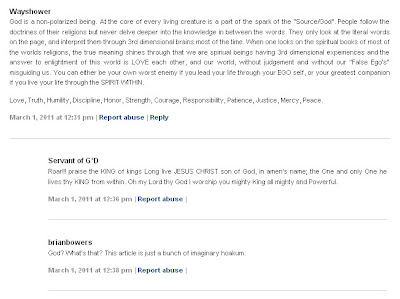I'll let theologians and scientists argue about what happens when people pray. The former might assert that prayer creates a direct line to a higher power, the latter that it produces electrical and chemical reactions in the brain that put the mind in a certain relaxed state.
In recent months, I've come to find another, more immediate effect of prayer: mindfulness.
I'm guilty of getting ensnared by my day-to-day life and as a result, I put the majority of my thoughts and efforts toward what I'm doing, what I should be doing, what I want to be doing, etc. I'm guilty of wasting too much time in idle pursuits, or vegging out after a day of work, essentially wallowing in ambivalence
Sometimes, however, I recognize the need to stop and focus on the issues affecting others in my life about whom I care. Sometimes, I feel the need to go the extra step to intentionally broadcast my hopes and well wishes for those people to the universe, to the higher power I believe is out there. Whatever it is. This is the act I call prayer.
When I do that, I become acutely aware that life is so much more than what's going on in MY daily existence. It helps bolster empathy and dispel apathy. I focus on the challenges, setbacks, or illness others are facing, and my desire for their happiness, good fortune, and health. Or, barring that, their peace of mind, comfort, and contentment. Sometimes, I actively imagine sending the love I have to that person directly, across the span between our physical bodies.
Does any of it work? Is there a higher power actually receiving these thoughts and feelings, and acting on them? Are those well wishes and all that love being piped to the recipients for which I intend them?
Again, I'll leave it to believers and non-believers to hash out. Personally, I feel I've had prayers answered and prayers ignored. And that's OK, perhaps to be expected, even. Mindfulness of others is both humane and fundamental for human existence. For me, it's the most basic essence of prayer, the core that remains even after all religious trappings or rational explanations have been stripped away.
That's something valuable in itself.





